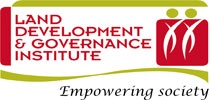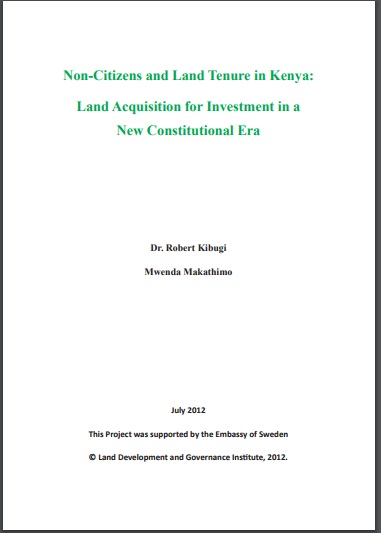Focal point
Location
Land Development and Governance Institute
MISSION: To contribute to improved livelihoods through offering a bridge between communities, stakeholders and policy makers in the promotion of equitable access and sustainable management of land and natural resources.
VISION: To become a centre of excellence in promoting the application of appropriate land policies, laws and management practices by empowering society through innovative and knowledge based advocacy and capacity building in Kenya and the region. LDGI values of Integrity, Trust and Professionalism influence the way we work every day and everywhere.
Members:
Resources
Displaying 56 - 60 of 73Food security and land governance factsheet
In Kenya, insecure land tenure and inequitable access to land and natural resources have contributed to conflict and violence, which has in return exacerbated food insecurity. Most farmers in Kenya have no legal title for the land on which they farm. Sources of tenure insecurity can be ethnic conflicts over land between neighbouring communities, particularly in the Northern provinces, expropriation by the state or local government and land grabbing by local elite or companies. Competition is as well growing over water, especially over groundwater, which is scarce in Kenya.
Non-Citizens and Land Tenure in Kenya
The acquisition of land by foreigners in developing countries has emerged as a key mechanism for foreign direct investment (FDI). FDI is defined by the Organization for Economic Cooperation and Development (OECD) as the category of international investment that reflects the objective of a resident entity in one economy to obtain a lasting interest in an enterprise resident in another economy.
Pilot Project to establish a Pro-Poor Land Information Management System (LIMS) for part of Thika Municipality
According to 2001 statistics, 924 million people, almost one third of the world’s population lived in slums. A majority of these people are in the developing countries and they account for 43% of the urban population. Slums are characterized by a dense proliferation of small, makeshift shelters built from diverse materials, degradation of the local ecosystem and by severe social problems.
Application of Fiscal Instruments in Land Management
Fiscal instruments are tools that governments use to manage revenue and expenditure and therefore influence the growth (or stability) of the various sectors of the economy. Government revenue is derived primarily through taxation. In Kenya, land taxation has contributed less than 1% of government revenue for the past three years. The Sessional Paper No.
Harnessing Proposed Land Reforms to Promote Environmental Conservation in Kenya: Lessons from The Case of Mwaluganje Elephant Sanctuary and Hombe Community Forest Association
Land plays a vital and central role in the economic, social-cultural and political lives of both individuals and communities. Given its centrality in the socio-economic and political spheres, national goals such as economic development, poverty reduction, social and political stability are closely linked to land. Land provides the livelihood base for the bulk of the population especially in the rural areas where agriculture is the main occupation. Despite their importance, land and environment in Kenya have suffered decades of mismanagement that has led to the current state of degradation.






